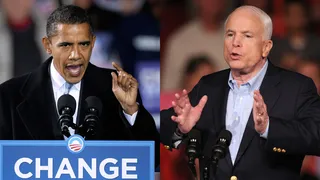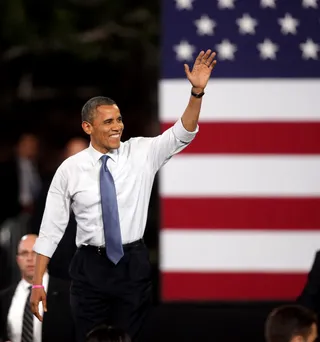How America Has Changed Since the 2008 Election
See how public opinion has turned in the past four years.

1 / 9
The Economy - BET.com analyzes new findings from the Pew Research Center and Gallup polling organization to compare voter attitudes from the 2008 election and today. —Britt Middleton In the 2008 and 2012 elections, 87 percent of people said the economy is "very important" to their vote, surpassing other issues including energy, terrorism and immigration. (Photo: Chip Somodevilla/Getty Images)

2 / 9
The Role of Government - In 2008, 46 percent of voters said they preferred a smaller federal government that provided fewer services. Today, 56 percent of voters agree with that statement. (Photo: Chip Somodevilla/Getty Images)

3 / 9
Congress' Failing Grade - In 2012, 65 percent of people view Congress unfavorably, up from 51 percent in 2008. (Photo: REUTERS/Kevin Lamarque)

4 / 9
America's Leadership - The number of Americans who feel America is falling behind globally has nearly doubled in the past four years. In 2008, just 26 percent of Americans believed China led the world in economic production, compared to 41 percent today. (Photo: AP Photo/Koji Sasahara)

5 / 9
Democrats Lose Ground - In 2008, 51 percent of Americans identified as Democrats compared to 48 percent in 2012. Republicans, however, have seen an increase from 39 percent in 2008 to 43 percent in 2012. (Photos: Courtesy GOP.org, Democrats.org)
ADVERTISEMENT

6 / 9
Social Influence - Social media sites make connecting to the presidential candidates easier than ever before, and more Americans are taking advantage. In 2012, more than 41 million people have "liked" the candidates on Facebook, up from only 2 million in 2008. (Photos from left: Barack Obama/Facebook, Mitt Romney/Facebook)

7 / 9
Obama vs. McCain in 2008 - Republican presidential nominee Sen. John McCain and then-Sen. Obama split support 50-50 among male voters. President Obama edged out McCain 57 to 43 percent among women. (Photos from left: Alex Wong/Getty Images, Steve Pope/Getty Images)
Photo By Photos from left: Alex Wong/Getty Images

8 / 9
Obama vs. Romney in 2012 - Mitt Romney leads President Obama 57 to 43 percent among male voters. Women still favor Obama in the polls, 54 to Romney's 46 percent. (Photos from left: AP Photo/Matt Rourke, REUTERS/Dominick Reuter)
